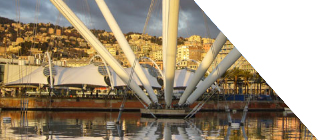
Istituto Nazionale di Fisica Nucleare
Sezione di Genova
Sezione di Genova
In questo sito non sono utilizzati cookie per la profilazione degli utenti. Utilizza cookie di sessione, necessari per il corretto funzionamento dello stesso e per gestire l’autenticazione ai servizi on-line, alla intranet e alle aree riservate... Leggi tutto
Questo sito utilizza cookie di sessione, necessari per il corretto funzionamento dello stesso e per gestire l’autenticazione ai servizi on-line, alla intranet e alle aree riservate. L’uso di tali cookie, che non vengono memorizzati in modo persistente sul computer dell’utente e si eliminano con la chiusura del browser, è strettamente limitato alla trasmissione di dati di sessione locale. La loro disattivazione potrebbe pregiudicare l’utilizzo di parte dei servizi on-line.